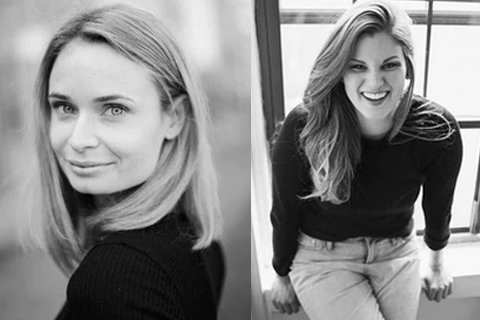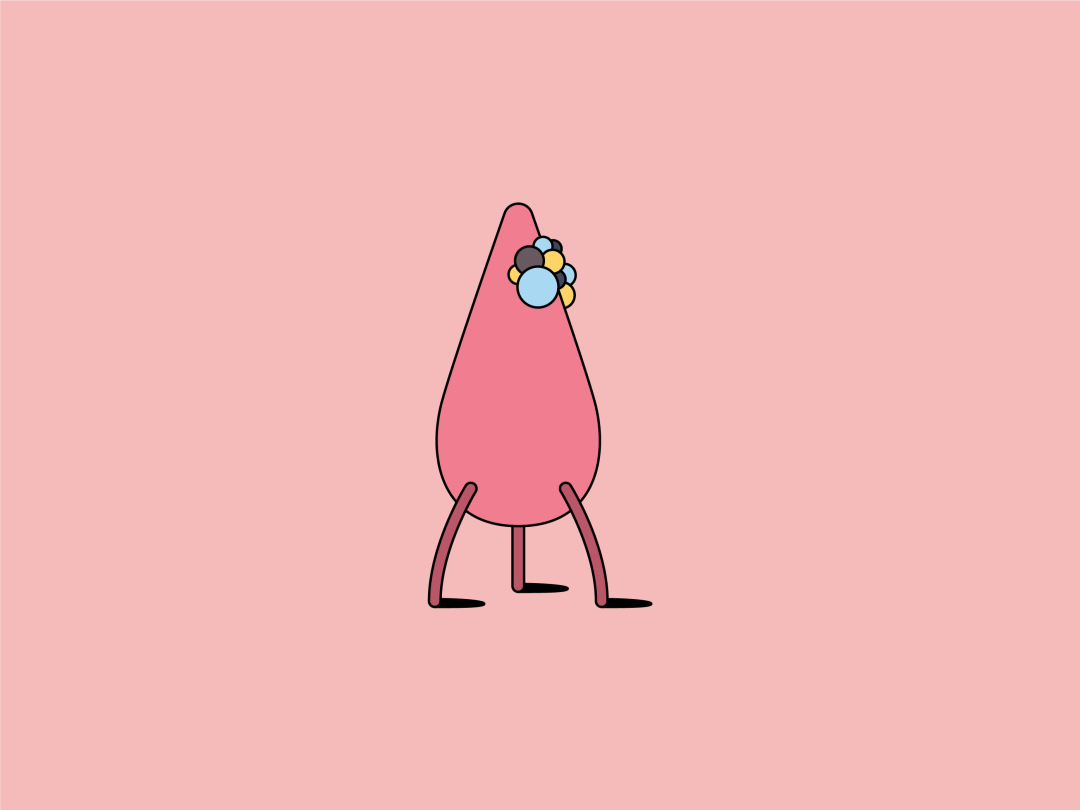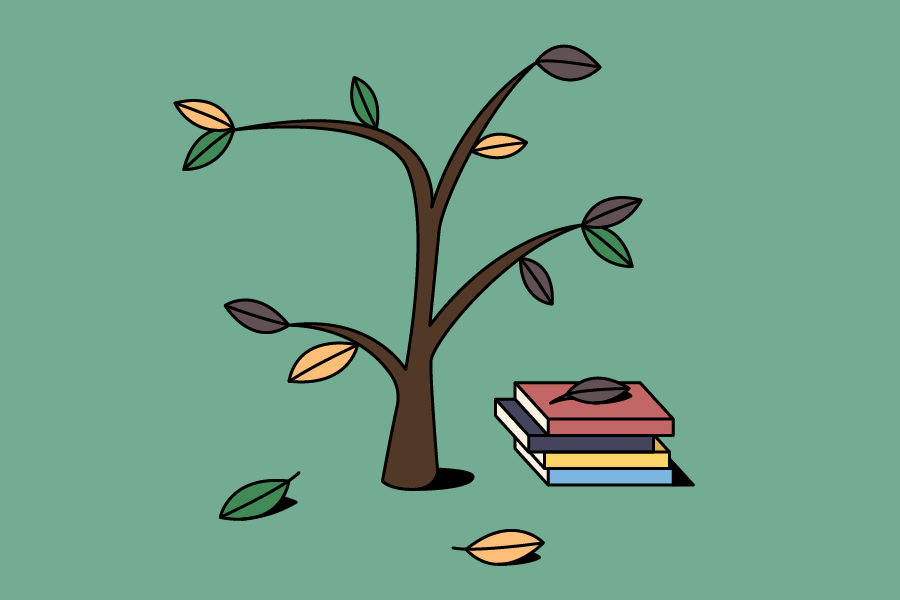Meet Filmmaking Duo Lisa Baron And Malin Barr, The Creators of Hedda Needs Help
thinx archive
·5 min read

by Team Thinx | 08/30/2016
Emma and I knew that we were in for a good interview when we asked Lisa Baron and Malin Barr if they would meet us for our interview on a Bushwick roof with pizza and wine. "Of course!" Lisa texted me, and several hours later the 4 of us sat cross-legged overlooking a Brooklyn sunset, listening to our neighbors blast the Beejees and Pras (eclectic) as pigeons sat in their coop nearby.
Lisa and Malin are in the final weeks of their Kickstarter, where they are attempting to make enough money to produce their first short film, Hedda Needs Help. It's just the two of them--Malin will be starring in the film and Lisa directing. They have hired 3 supporting actors, and have rewritten the script together for the last few months. In between banter that was *just* as funny before the wine, we talked about women in film, making work for yourself, and what it means to truly "make it."
E: So we really want to talk about women in the entertainment industry, especially what it’s really like trying to break into the entertainment industry. Do you have any thoughts about that, off-the-bat, or any stories of any issues or struggles you’ve encountered?
M: I think up until recently, a lot of things seemed like normalities to me. I moved to NYC three years ago from Sweden, and I think I came over, like, a very naive person, just trying to reach into a world that I didn’t know much about, and going for any opportunities that I could. That’s changed during the years, very much. But then, I think about a year ago when I started writing this script, I felt like I had enough of going to auditions where it was either a really bad script or a really bad director, or a bad project that was just a waste of time working for free when it wasn’t doing much for me. And also, for me--what I look like, or whatever--I get stereotyped as a blonde, or as a model, or as a love interest that always has stupid dialogue. I always get asked if I can ‘do some nudity?’ when it never really said anything about nudity in the breakdown, and it only comes out later on. But then you’re already there on set, and what do you do? You don’t want to be the person who just stands there and stops the production from moving forward--to be the annoying one--but at the same time, it’s like, of course I should say ‘No. It wasn’t in the details.’ For example, I was in an intimate scene last year for work, and it was basically a sex scene but with underwear on. But it was *so* *awkward* because after a while I just looked around and I realized that everyone in the room was men! And it was like 12 of them! And like, only four of them really had to be there, not 12. But everyone was kind of hanging around...
L: Creepin’. Straight up, creepin’.
M: Yeah! And I was like, ‘oh this is so awkward’ and then I had that moment where I was like, ‘should I say something?’ and then you feel like you’re just being annoying.
L: Like all of a sudden you’re overly righteous because you’re half-naked and you’re the only woman around…
M: Exactly. But then I actually did; I asked for a woman to come in--usually they’re on wardrobe or something, which is where so many women in film wind up, and it’s like, ‘No, we can do so much more than that’--not that there’s anything wrong with wardrobe, but film jobs are so gendered and divided still--but anyway, I asked our wardrobe person to come up and be in the room when we shot the scene, and she came up and she was like, ‘Yeah of course! Why did noone say anything?’
L: Kristen Frost is producing our film and she’s amazing, and she’s had to ask men to leave on sets before. But, like, being a woman you just kind of get it. Representation is so important behind the camera. You can feel the tension that guys maybe just don’t recognize.
M: If there were more women in film, these things wouldn’t just happen--because women would have that intuition, like, we don’t need ten extra guys in this room.
L: Yeah, I mean we’ve written this script that I think does play off the stereotypes of women--and the main character tries to reflect those stereotypes because she thinks she needs to in order to make her goal. But she’s always kind of awkward and doesn’t really quite fit in them, because it’s not really her. Like, she tries to use sexuality and she’s like ~*barf noise*~ because it’s just not her. It’s not her to be forceful like that. And we’ve written it naturally, trying to get that voice, or get that idea out and I don’t think it was until after that we went back and realized ‘Oh! This is why we wrote it like that, this feels relatable to us’. Also, the differences between genders in film are extreme in other areas, too. Like if a guy has basic, minimal experience in, like, FinalCutPro, he’ll call himself an expert on his resume or his reel, and he’ll go for the interview, whereas I--I’ve been doing this for four years now on some level or another--from writing or being behind the camera--and I still don’t call myself a director and I don’t call myself a writer, like I still have trouble saying that.
E: Well, that was sort of my next question--it’s so inspiring to me that after seeing so many dudes just decide that they have the skills and that their creative prowess is good enough to just start their own projects, that you ladies were able to find the confidence to sit down and say ‘I’m just going to write a script.’ And then do it. How did that happen for you?
M: I wrote the original script on my last day of vacation last summer visiting my sister in Amsterdam, and I had this, like, panic that I didn’t want to go back to New York and just, like, do the same old thing. There was a point where I decided that I needed to take control and to do something for myself. So I had that moment, where it was like, it’s 4 o’clock in the morning and I was supposed to go to the airport in three hours and I laid on her floor and wrote basically like 75% of the script right there. And then I brought it back, and I had those thoughts of, like, ‘should I really do this?’ And then Lisa and I met through a mutual friend, and connected immediately as creatives. Getting the positive feedback from Lisa just encouraged me to move forward with this so much quicker, and then we finished the whole thing together, after many drafts.
L: Yeah, I mean I’m still navigating the confidence thing, and while it is really nice to have a community behind you, I keep learning the same lesson: I always think that I’m not as experienced as some random guy who says he’s, you know, whatever part in film, doing whatever job, and I’m just like, ‘Ok, then I must trust them, I have to believe them.’ The assumption is that they know what they’re doing, whereas for women it’s usually the opposite. I constantly keep coming back to this idea that my voice is just as good as theirs, and my work is just as good, and it’s taking me a long time to believe that and to figure it out.
M: Yeah, it feels really empowering to actually do it.
K: Yeah, Emma and I relate to that so much. Like, even just today I said, well ‘Coming from a kind-of-writer…’ and I was like, no, I get to paid to write, and I have a real following. I am a writer. Women are just conditioned to doubt themselves all the time.
L: There’s still such a trope about women who are assertive, being called ‘bitches’, and it’s cliche at this point, but it’s still so true. It’s like you can’t be proud of your work or yourself or take charge without turning people off.
E: Yeah, and I mean it’s like when you’re in a room full of men and you feel like you don’t have anybody who would naturally be on your side or understand you, it can be so hard to voice how you’re feeling and to be authentic about it. Especially when it’s a question about your body!
M: Exactly.
L: Right! Also I have a cinematographer friend who is a small woman, like small in frame, and she’s constantly being ‘tested’ when she’s on jobs, to see if she can carry equipment, etc. And no guy that I’ve ever met has ever had to do that for a job. And this is her *own* equipment that she’s owned for years, and she still has to prove to them that she can handle it.
M: On top of that, I worked with a director/cinematographer recently, and he could not carry his camera. We had to change the whole shot on set because he was like, ‘it’s too heavy’--like how did you not plan that out beforehand??
E: Totally. I just think it must be interesting writing a film in this time period, because film and media in particular are really scrutinized as storytelling methods in terms of social issues, and people are very focused on highlighting different social issues in whatever you’re writing about, um, have you thought about that much with your writing? Obviously it’s focused on a woman which deals with social issues of its own breed but, was there ever any pressure to expand that?
M: Because it was based on our experiences, it naturally just ended up at a place exhibiting female power and flexibility on film. It was really already there in a lot of ways, and it was just a matter of focusing it more through filming and directing to determine exactly where it will end up, um, but we didn’t pressure it in the beginning, we just let the story come to life first, and then we found those moments that highlight different social issues. There’s a reason that’s driving everything forward, it’s not just a random story, it has a real purpose behind it. Building the character and her journey through the story came very naturally.
L: I just write what I think is funny and what I would want to see, or what I would want to watch, and in the end you see the purpose, and the reason why you wrote it the way you did. You can see where it was influenced. I don’t feel pressure to highlight any specific social issues beyond what I know because I know what’s coming from me is authentic.
M: I really just wanted to write a human character, someone who was relatable to other women who fall somewhere in between all these stereotypes--someone who is neither a ‘tomboy’ or a ‘girly-girl’ (but I don’t really like that term anyway), and to just show that women are complicated and can have dark thoughts and can still be approachable. I never get to play like a human woman who isn’t a robot or who isn’t predictable. It’s all really exciting.
E: And everything you’re talking about just speaks to the real importance for diversity of all kinds in film, like everyone writes from a place within themselves and everyone is writing about their own experiences, and it’s important to have visibility of all these different experiences on film. On a different note, I feel like you always hear about how difficult it is to ‘break into the film industry’ these days, and that’s why I’m so impressed by people like you who just decide to break into it yourselves. Were you ever discouraged, though?
L: Yeah, having auditioned so many incredibly talented women for this film you just learn that you can’t be perfect for every project--like so many of them were great actresses, but they weren’t right for our project. That’s a hard lesson to learn but it’s important.
K: Yes. So moving into the script, what I loved most about it was like Hedda is kind of the anti-hero in this story. She makes a lot of mistakes throughout the movie, and she doesn’t have it figured out the whole time. She always has a goal in mind, but she’s not quite sure how to get there. And I love that so much because sometimes I feel very bored of women who are made to play the straight-faced character while the guys get to have all the fun, and get to figure things out along the way, while women rarely get the opportunity to mess up in film. Was that intentional--making Hedda the anti-hero, or no?
L: Mmm, that should have been our synopsis. Right there. Done. Nice.
M: *laughing* Totally, totally. I feel like I brought a lot of myself into the script, and how I’ve felt since I moved to New York--that when you get here there’s so much excitement, and it’s a lot of like ‘I’m going to do this, and this, and this’ but then not a lot of those ideas actually work out. And she’s very determined--she chooses something and she goes for it, without really knowing if it’s going to work. So I think it’s intentional that she fails and fails and fails, because we wanted to make her a likeable person. Everyone roots for her because she’s not meaning to make these mistakes, and she’s not meaning to be an evil person.
L: We wanted her to be dark, though. We wanted her to be dry, and to not always be thinking about the consequences, or who will still love her after this or that--she’s just going to go, and grab it.
M: Yeah, she knows what she wants and she’s going to go get it. The story is very much about, like, if you’re determined, how far are you willing to go to achieve that?
K: It seems like the central theme of the film is, like, ‘Making It’ so do you feel like if you are able to complete this film, no matter what happens, do you feel like you will have made it?
M: I’m already really proud of us, to be honest. Every time we’ve met, every time we commit to doing something, we get it done--when we do the castings, when we started the Kickstarter, doing interviews, whatever--I’m always so excited that we’re becoming more creative with everything that we do. We started writing, we decided we’re going to do this, and now we’re being more creative and creating so much content, more than I’ve done in a while, and in a way that is really such an accomplishment.
L: Yeah, absolutely. I feel like I have definitely made it with this film. I feel like for the first time I feel like something I’m doing has a bigger purpose, being able to talk about women in film, and it makes me feel very productive and like a real member of the film community.
To find out more about the Hedda Needs Help Kickstarter, click here!
by Team Thinx


